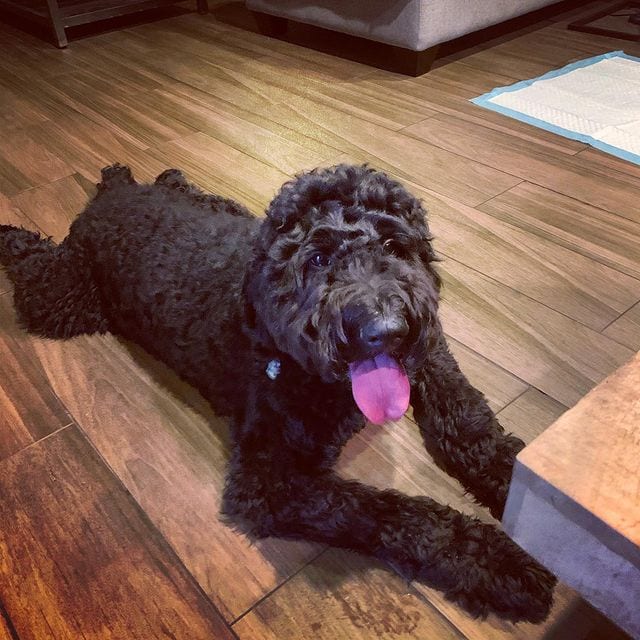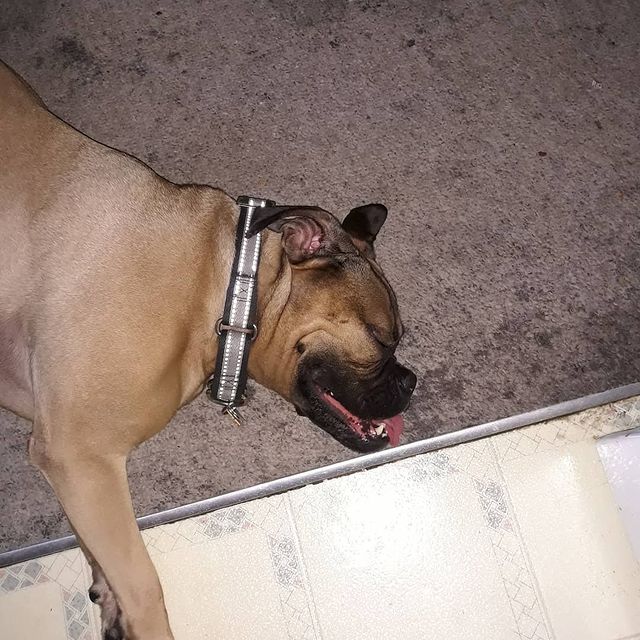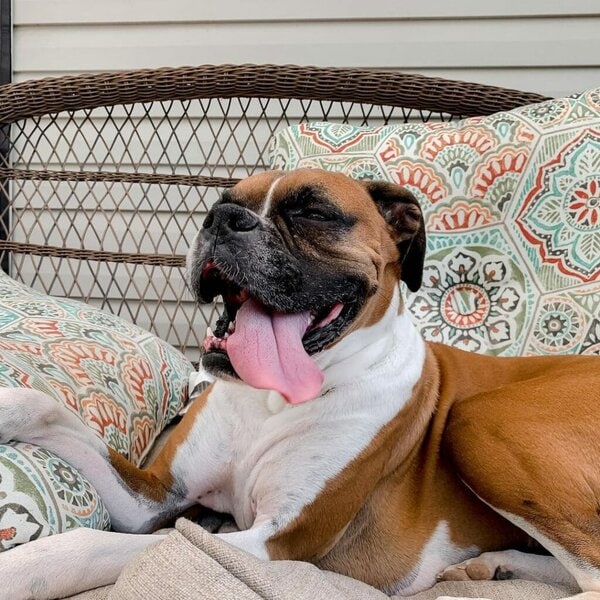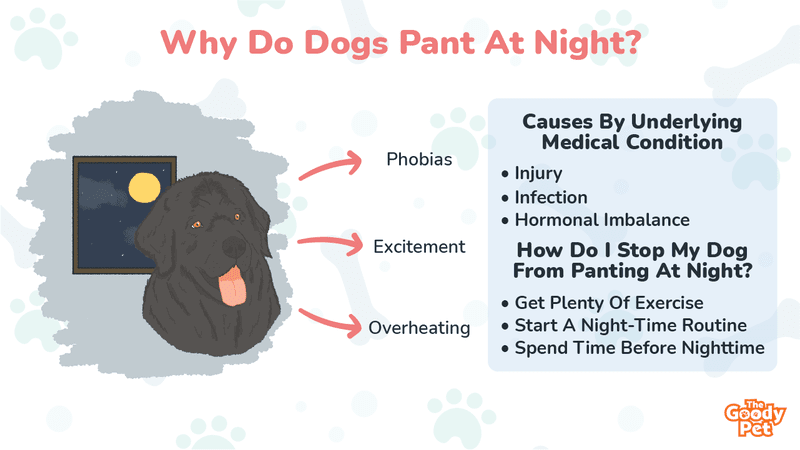Panting is more or less to dogs than purring is to cats. Every dog does it, and it means something different every time. While panting is normal for your furry buddy, panting specifically at night could be cause for concern in some situations.
Dogs pant at night for all sorts of reasons, both innocent and worthy of concern. The most common reason why your dog may be panting at night is excitement. However, it could also be a result of anxiety and a few other negative reasons.
In the sections below, you will learn all you need to about why dogs pant at night. We will walk you through how each reason manifests so you can narrow the possible causes down to the most likely in your pooch.
Finally, we shall look at how you can stop your dog from panting at night, so you don’t have to keep worrying about them every night.
Why Do Dogs Pant At Night?

Dogs pant at night mainly due to excitement and high energy levels. Most of the causes of this phenomenon are relatively innocent, as you will see shortly. However, there are a few causes that are worthy of concern.
So what are these reasons? Let’s find out.
Excitement
Panting is one of the main ways that dogs express their excitement to their human companions as well as to each other. This will happen whether it is night or daytime as long as your doggy has the energy to spare.
In addition to the panting, you will also notice that your dog is restless and very eager to be around you. They are doing this to either get you to play with them or simply spend time with them.
Anxiety
Dogs suffer from anxiety just like we do. Separation anxiety, in particular, is very common in dogs that were either traumatized at some point or pulled from their litter too early. One way that this separation anxiety manifests is through panting at night.
In these cases, dogs may pant excessively as a response to being made to sleep away from their human companions so that they have formed the deepest bonds.
Phobias
Another common psychological issue that can cause your dog to pant excessively at night is fear. Phobias in dogs can be triggered by a number of things, from sudden loud noises like car horns to darkness and even small critters and insects, such as raccoons and cockroaches respectively.
Besides panting at night, the dog may also display other signs of fear including shaking, hiding, and increased vocalization which in most cases ends up being whining.
Overheating
Dogs do not sweat through their skin as humans do. Instead, they rely on a variety of mechanisms, including panting, to get rid of the excess heat. If your dog is panting at night, it could be because they are feeling hot.
The best-case scenario here is that the weather is just hot, in which case all you may have to do is pop open a window or turn the air conditioning on.
On the other hand, panting at night could be to offer cooling to your dog due to more nefarious reasons like a fever from an infection.
Pain
Pain causes dogs to act in very bizarre ways, from restlessness to increased vocalization. Some dogs also pant excessively, including at night, as a result of the discomfort they may be experiencing.
Pain is perhaps one of the most worrying reasons why your dog is panting at night. This is because the pain that drives your dog to the point of panting is nothing short of excruciating.
Should I Be Worried That My Dog Is Panting At Night?

While most reasons why your dog is panting at night are innocent, you may have just cause to be worried by this behavior. For some perspective, here are a few things that could justify concern if you notice that your dog is panting excessively at night for no apparent reason.
Infection
Infections can cause your dog to pant either due to pain or the associated fever. If the infection is on the dog’s skin, you may notice some lesions that will most likely be oozing pus.
If the infection is internal, you may have to rely on other clues, including:
- Reduced energy levels
- Reduced appetite
- Reluctance to handling
- Fast breathing
- Hypersomnia (sleeping more than usual)
Injury
Another reason you may have to worry if your dog is panting a lot at night is the likelihood that they are uncomfortable following an injury. Injured dogs will typically also excessively lick the area of the injury.
Furthermore, if it is a limb, you will also notice that your dog is limping to avoid putting any kind of pressure on the affected limb.
Hormonal Imbalance
The most important hormonal issue you may have to worry about in a dog that is panting excessively at night is hyperthyroidism. This is where the dog’s thyroid gland produces too much thyroid hormone.
This results in a number of signs, including panting due to hyperthyroidism-induced intolerance to heat. Fortunately, it is an extremely rare condition in dogs.
How Do You Stop A Dog From Panting At Night?
If you want to stop your dog from panting, the best step to take is to consult a vet. This is because many of the reasons why your dog is doing it are health-related.
A vet will evaluate your dog and find the health issue. Should there be one, appropriate treatment and management can commence.
However, there is a lot you can do for your dog if the panting is for less severe reasons. Here is a bit more on some of these tips and tricks that will help put both your dog and you out of your misery from excessive panting at night.
Spend Time With Your Dog Before Nighttime
Sometimes all your dog wants from you when they are panting excessively at night is some attention and a bit of your time. So if you want to stop them from panting, the solution is to give them what they want.
Spend a few minutes before bed playing with them or simply cuddling and hanging out. It will make their world a difference, especially with dogs that suffer from anxiety or those that are simply hyperactive.
Establish A Night-Time Routine
Working with a night routine could do wonders for dogs that suffer from psychological issues like separation anxiety and phobias. Knowing what to expect instills in them a sense of security. This might be all you need to do to put an end to the incessant night panting.

Provide A Comfortable Place For The Dog To Sleep
Dogs may not be fussy about where they sleep, but if your pooch is panting a lot at night, you may want to consider switching up the sleeping arrangements as a way to stop the behavior.
Make sure that the dog bed is clean, comfortable, and, most importantly, in this case, Goldilocks levels at just the right temperature. If the weather is hot, invest in well-aerated bedding and ensure that you set the dog bed up in a cool part of the house.
Ensure That Your Dog Gets Plenty Of Exercise Daily
A little exercise goes a long way when dealing with a dog that is panting excessively due to excitement and high levels of energy. It is best to plan for exercise sessions or playtime later in the day.
Suppose you have the time to spare, plan to play with your dog, or walk them a few hours before they have to go to bed. This will help to ensure that they have no energy to use against you with things such as barking, panting, or even pacing.





